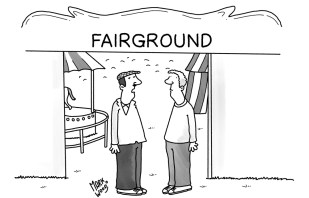Have you ever loved someone and got nothing back? Next question: was it really so bad? We all feel things for people who don’t even know we exist, and the experience is often enriching. For me, David Bowie’s life held meaning. If the Thin White Duke did not rate as your personal companion, then our late Queen almost certainly did; or, if not her, then what about Walter White, from the TV drama Breaking Bad, since we love fictional characters too? Walt saw me through my divorce; and we enjoy these relationships in private. Sometimes we meet fellow fans, and then, as the cheery Michael Bond points out, ‘one of the incentives for being part of a fandom is that you get to do things with others’.

Bond sketches the psychology of belonging very lightly in his book. Why is it, he asks, that sports fans seem to get a free pass when it comes to chanting, dancing and face-painting? (I’d like to see Trekkies trying to get away with such ebullience in public.) Next, he notes that sport is a zero-sum game – ‘if I win, you lose’ – and this leads to un-reasonable love for one’s team, and unreasonable prejudice towards one’s opponent. But having begun with such promise, Bond does not connect these observations, and so fails to convey why his subject is important.
So let’s do his job for him. Fans are a species of tribe, and – this is important – tribes win respect the more tribal they are, which is why sports fans are rarely shamed for being overzealous. ‘Their commitment to the cause is expected, even applauded,’ says Bond. Tribal behaviour is exciting. It’s had us building civilisations and spilling each other’s blood for more than five millennia. Fan groups are simply defanged tribes. This is why we can, if we want, describe most the achievements of world civilisation in the bathetic terminology of fandom. What else is sincere religious faith but a non-reciprocal fan relationship?
Scratch a fan and you’ll find a zealot – the more serious, the more dangerous. Bond’s most engaging passages deal with fans who think their celebrity owes them love and attention. The experiences of the songwriter and social media star Lizzyspit are illuminating, being driven off social media by an outpouring of hate because she didn’t post in the weeks immediately following her father’s death. The more pathological fandom is, the more interesting it becomes, and this is bad news for Bond, who would much prefer to champion its emollient, jolly side.
His favourite fans are pro-social – like the Jane Austen Pineapple Appreciation Society, which has, since December 2020, ‘been engaging in an ongoing conversation on its social media feeds about the use of the pineapple and the origins of white wealth in the early 19th century’. (Yes, in the midst of a sixth extinction and a second Cold War, this is the hill they have chosen to die on.)
Bond’s detours into the dark are few, and conducted in a spirit of apology and understanding. Therianthropes believe they are born into the wrong species (Bond’s definition of fandom does slither about to subsume every oddity). But theirs apparently is ‘not an obsession or a mental disorder’ – only ‘a conviction, one that therians spend their entire lives trying to accommodate’. The sophistry at work here is miasmic.
What’s missing from the account – and perhaps we can understand this, given our current political moment – is not more horror stories but simple bread-and-butter scorn – as in the sinking feeling one gets when hearing that the social psychologist Courtney Plante at Bishop’s University, Quebec is a furry; that his ‘fursona’ is a neon blue cat called Nuka, and that he’s also a fan of the animated TV show My Little Pony: Friendship is Magic, which makes him a Brony.
There’s something off here, something that’s the very opposite of joyful. Therians spend their lives online criticising the inaccuracies in each other’s accounts of life as a wolf, an ocelot or whatnot. Jolly? I think not. And, yes, scorn is a crude response, but it’s better than sticking both thumbs in your ears and going la-la-la. Scorn says ‘Dig here! There’s something worth truffling for.’ Michael Bond turned up without a spade.






Comments